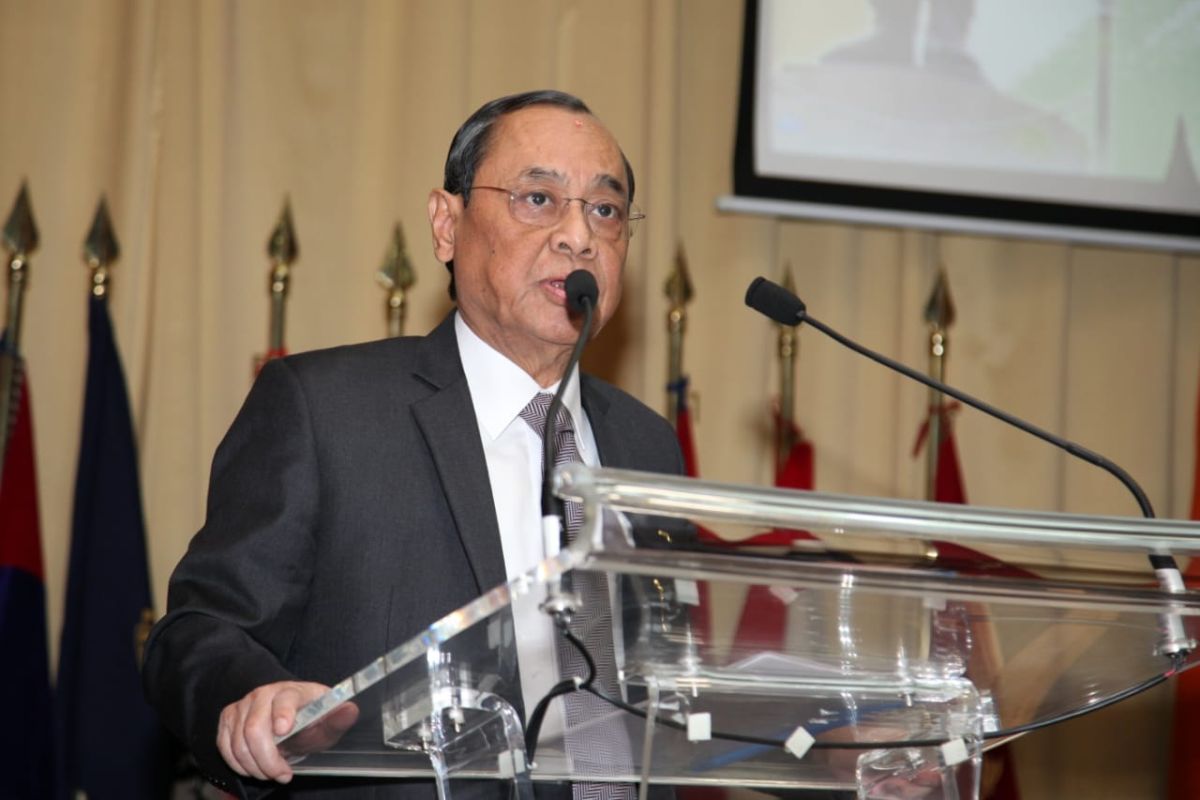After resolving the 134-year-old politically and religiously sensitive case apart from other major cases, the Chief Justice of India Ranjan Gogoi’s 13-month old tenure has come to an end.
The Ayodhya land dispute of independent India was settled down by the Supreme Court on November 9 through its 1,045 pages judgment giving the 2.77 acres of disputed land to the Hindu party while a separate 5 acres at a prominent site in Ayodhya to Sunni Waqf Board.
Advertisement
A five-judge bench headed by the Chief Justice of India, Ranjan Gogoi delivered the landmark judgment, resolving the decades-old dispute of the ownership rights. With this, the name of Ranjan Gogoi will be embedded in the history books, making him immortal in the Indian Judicial system.
Ranjan Gogoi is known for his tough personality and quick decision-making abilities. His comments on the final day of the 40-day marathon hearing on the Ayodhya dispute, ‘enough is enough’, give an insight about his mettle in the face of even the gravest situations, not less than the Ayodhya case here.
He not only played a crucial role in delivering the judgment on the issue but was also keen to look after the law and order situation. On November 8, a day before the judgment, Ranjan Gogoi, accompanied by CJI-designate SA Bobde and Justice Ashok Bhushan got a briefing from the UP’s chief secretary and director-general of police on the steps taken to ensure the law and order situation in the holy city of Ayodhya.
Born in a prominent family in Assam, Ranjan Gogoi was sworn in as the 46th Chief Justice of India on October 3, 2018, with the tenure of 13 months ending on November 17, 2019. His father Kesab Chandra Gogoi was the Chief Minister of Assam for two months in 1982. He was the Member of the Legislative Assembly from Dibrugarh constituency.
Law: Gogoi’s first love
On-demand of his father, Ranjan Gogoi appeared for UPSC exams and even cleared it. But he was honest enough to tell his father that his interest lies in pursuing law.
In 1978, Gogoi joined the Bar Council and practiced on Constitutional, taxation, and company matters at the Gauhati High Court. He became the permanent Judge of the Gauhati High Court in 2001.
His journey as a lawyer and a judge in Guwahati came to an end in 2010 when he was transferred to the Punjab and Haryana High Court. A year later, he was appointed as the judge of the Supreme Court of India on April 23, 2012.
Ranjan Gogoi’s journey in the legal arena fuelled up after he came to the apex court. There were multiple challenges lined-up for Gogoi that was to test his nerve to the nth.
Face-off with CJI
On January 12, 2018, Ranjan Gogoi triggered a controversy when he, along with three other senior judges, who were part of the Supreme Court collegium, the highest decision-making body in the judicial system, came out to speak to media about their grievances related to the then Chief Justice of India Dipak Misra.
Ostensibly, it was their mark of protest as to what the four Justices, Jasti Chelameswar, Ranjan Gogoi, Madan B Lokur, and Kurian Joseph claimed was bypassing the established tradition of the courts in assigning cases to the judges by Chief Justice Dipak Misra. They also questioned the way in which the court had dealt with the finalizing of the memorandum of procedures and guidelines that guard the appointment of the judges of the apex court.
Apart from these issues, the judges also raised the issue of the case of the death of CBI court judge Brijgopal Harkishan Loya. Justice Loya was presiding over the case of fake encounter of Sohrabuddin Sheikh, a case in which the present Home Minister Amit Shah was accused.
There were claims that the death of Judge Loya was not natural and demands for an independent probe erupted.
Contempt notice to Justice Katju
Another sensational decision of Ranjan Gogoi was the issuance of contempt notice to former Supreme Court judge Justice Markandey Katju on November 11, 2016.
Justice Katju was called by the Supreme Court over his Facebook post criticizing the way in which the court was tackling the sensational Saumya murder and rape case of Kerala.
The 3-judge bench of Supreme Court comprising Justice Ranjan Gogoi, Prafulla Pant, and UU Lalit set aside the life sentence awarded to the accused Govindachamy by the Kerala High Court. The decision was criticized by Justice Katju in his Facebook post. The bench took suo motu and called Justice Katju in the court. In the courtroom, Justice Gogoi underlined certain remarks on the print out of the Facebook post of Justice Katju and said that these remarks are made against the judges and not an opinion on the Soumya case judgment. Further, he issued a contempt notice to Justice Katju.
Accusation of sexual harassment
Apart from the accomplishments that decorated Gogoi’s tenure as CJI, he also had to face an allegation of sexual harassment by a woman in April 2019.
The complainant, who worked for Justice Ranjan Gogoi since October 2016 as a Junior Court Assistant alleged that she had been sexually harassed by Gogoi. She also alleged that she had been unlawfully dismissed from service.
A bench was constituted which passed an order dismissing the complaint as baseless. The court termed it as ‘Matter of Great Public Importance Touching Upon the Independence of Judiciary’.
Other major judgments
There are other important cases that Ranjan Gogoi took charge of.
Before retiring, CJI Ranjan Gogoi also cleared the path for the entry of women in the Sabarimala Temple in Kerala. In a judgment, the court didn’t stay its September 28, 2018 order allowing the entry of women of age group 10 years to 50 years in the temple. The 5-judge bench headed by CJI Ranjan Gogoi referred the case to a larger bench comprising a seven-judge Constitutional bench.
Another judgment was on the Rafale jet deal that became a primary topic during the 2019 general elections campaign by the opposition Congress party. A three-judge bench headed by CJI Ranjan Gogoi and comprising Justices SK Paul and KM Joseph was hearing the review petitions against its December 14, 2018 judgment. The apex court had dismissed petitions seeking a review of its judgment refusing a CBI investigation into the Rafale fighter jet deal with French firm Dassault Aviation and giving the government a clean chit.
Gogoi was also involved in landmark judgments like famous Aarushi murder case and attacks on former Jawaharlal Nehru University Student Union leader Kanhaiya Kumar. He was also involved in monitoring the National Register of Citizens exercise in Assam.
Whenever the pages of the Indian judiciary would be flipped, outgoing CJI Ranjan Gogoi’s name would appear amongst the judges who stood up to the most difficult of challenges and decided on the cases with firmness and resolve; the cases that changed the course of Indian politics. Irrespective of the controversies surrounding his tenure and judgments, Justice Gogoi has impressed upon many, including the layman and the legal experts. Marking his last working day on Friday, Gogoi sat in Court no. 1 with his successor and issued notices in all 10 cases that were presented to him.
















